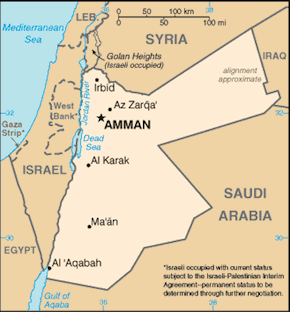The pro-democracy protests spreading across the Middle East have found some eager supporters in Jordan, where thousands took to the street of Amman to demand that Prime Minister Samir Rifal step down and that a new, elected government be allowed to take its place.
 Official figures from police said that roughly 3,000 people attended today’s protests, including Islamists, leftists, and union members. As with the protests elsewhere in the region, the combination of inflation and unemployment is combining with long-standing resentment at authoritarianism and producing explosive results.
Official figures from police said that roughly 3,000 people attended today’s protests, including Islamists, leftists, and union members. As with the protests elsewhere in the region, the combination of inflation and unemployment is combining with long-standing resentment at authoritarianism and producing explosive results.
Under Jordanian law, the King appoints the Prime Minister, the Senate and the entire cabinet, so while the bicameral legislature does have an elected “Chamber of Deputies,” in practice elections mean very little.
Interestingly enough though, the pro-democracy protesters are targeting the prime minister in their calls for free elections, rather than demanding that the king himself step down. This suggests they may envision some sort of constitutional monarchy in which the king retains figurehead powers but relinquishes most of his authority to elected officials.


